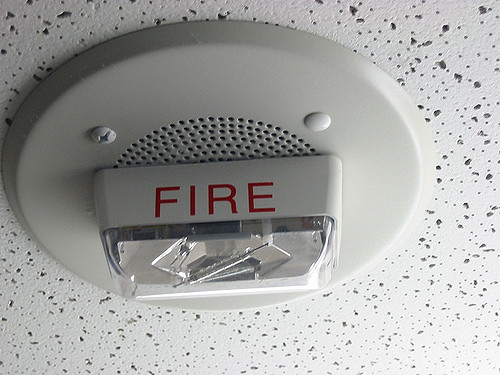You had just laid your head on your pillow, exhausted from a long day of classes and homework, an equally long day awaiting you tomorrow, but you could think of little except sleep. You reached over to turn off your light, and then it happened.
The peaceful silence was shattered by the familiar high-pitched wail of the fire alarm.
If you have never been part of a fire evacuation of a Capital residence hall, then you are probably a commuter because they happen all the time.
Wesley Snow, the interim director of facilities management, said the type of fire alarm system varies slightly from building to building, but all the residential halls have some kind of addressable alarm system. That is, they all have the kind of fire alarm system that can pinpoint the section of the building that the smoke is coming from as opposed to a conventional fire alarm system that only can tell you there is smoke somewhere in the building.
“All smoke heads use photo eye ion type detection,” Snow said. “Any gas, vapor, etc. that has particles can be detected.”
This means that the alarm can be triggered more easily than you might think.
“We have a number of false alarms from vapor cigarettes this year,” Snow said. “Also, dust from the outside coming into windows, hair straighteners, curlers, even hair dryers, which could burn hair, have been reported. Also, burnt food in the microwaves. Sometimes we get miscellaneous devices that are not allowed in the dorms, such as toasters.”
Food in the microwave probably would not surprise anybody, especially not Hudson Hayley, a sophomore who lived in Lohman last year.
“The most common thing set off the fire alarm has to be burnt popcorn,” Hayley said. “The sound of the fire alarm is almost always accompanied by the smell of burnt popcorn.”
But not all reasons for the fire alarms being triggered are so innocent; sometimes it can be reckless, borderline dangerous behavior.
Amber Bradley, a sophomore living in Saylor-Ackerman, said, “Last year, two guys set hand sanitizer on fire, and that set [the fire alarm] off.”
Clearly, there are multiple ways any one of us could potentially trigger the fire alarm, and with hundreds of students living in each residential hall, it is no wonder it happens so frequently. However, this probably does not decrease the frustration over the inconveniences a fire evacuation brings, especially if they occur frequently.
“Fire alarms were pretty constant in Lohman,” Hayley said. “Nothing was more inconvenient than coming back to my room after class and trying to take a nap only to have the fire alarm wake me up halfway through.”
Bradley shared the same feelings about a far more recent fire alarm.
“The fire alarm went off the other night right when I got out of the shower,” Bradley said, “so I didn’t like that very much. It was also, like, 2 a.m., and I wanted to go to sleep.”
The most disturbing finding is the fact that, despite the constant fire evacuations, no one is able to recall a time that it was due to an actual fire. Every time, it seems to be some kind of false alarm.
Next time you see a fire evacuation taking place, go stand among the students who had to leave their rooms, and you will almost certainly hear griping about the inconvenience and about the carelessness or stupidity of whoever set it off. People will take turns guessing what set it off. Probably burning food in the microwave? Possibly somebody trying to cook in their room? Maybe somebody with a vapor cigarette?
That points to the biggest problem with the constant triggering of the fire alarms. If every time is a false alarm, how can we be expected to take it seriously? What risk do we run of becoming complacent and ignoring the alarms altogether? Fire alarms are designed to save lives, but is it possible that by going off at every innocent or reckless mistake a student makes, it could have the inverse effect?
Sure, fire evacuations are protocol when the fire alarms go off. But in Aesop’s fable, “The Boy Who Cried Wolf,” it was protocol for the villagers to rush to the boy’s defense whenever he called. Yet, after too many false alarms, the frustration at the idea of another inconvenience overcame the inclination to follow protocol, and they simply ignored him.
Of course, the villagers were not at risk of being the wolf’s victims, so maybe heeding the alarm is of greater personal interest to us than it is to them. Perhaps we should avoid trying to guess the cause of the alarm and, instead, remind ourselves of the possibility, however remote, that there really is a fire.

